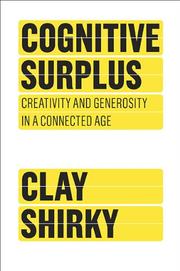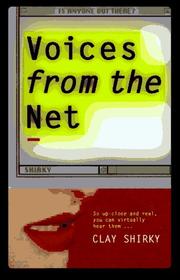| Listing 1 - 10 of 17 | << page >> |
Sort by
|
Book
ISBN: 9781846142178 9781846142185 1846142172 Year: 2010 Publisher: London Allen Lane
Abstract | Keywords | Export | Availability | Bookmark
 Loading...
Loading...Choose an application
- Reference Manager
- EndNote
- RefWorks (Direct export to RefWorks)
42 p.
Information society. --- Social media. --- Mass media --- Social aspects. --- Sociology of culture --- Vrijetijdsbesteding --- Televisie --- Trends --- Cultuursociologie --- Recreatie --- Trend --- Onderzoek --- Geweld --- Information society --- Social media --- Social aspects
Book
ISBN: 9789047000808 Year: 2008 Publisher: Amsterdam Business Contact
Abstract | Keywords | Export | Availability | Bookmark
 Loading...
Loading...Choose an application
- Reference Manager
- EndNote
- RefWorks (Direct export to RefWorks)
Information technology --- Social aspects --- Computer networks --- Internet --- Online social networks --- 691 Informatiemaatschappij --- Information (gestion) Informatie (management) --- Internet Internet --- Réseaux Netwerken --- 366.45 --- communicatie --- internet --- sociale netwerken --- Informatiemanagement --- Netwerkcommunicatie --- Netwerken --- Teamwerk --- Organisaties --- Trends --- Communicatie --- Cultuursociologie --- Communicatiesociologie --- Netwerk (ict) --- Organisatie --- Trend
Book
ISBN: 9780141030623 0141030623 Year: 2009 Publisher: London Penguin Books
Abstract | Keywords | Export | Availability | Bookmark
 Loading...
Loading...Choose an application
- Reference Manager
- EndNote
- RefWorks (Direct export to RefWorks)
Social interaction --- Interpersonal communication --- Information technology --- Internet --- Online social networks. --- Electronic discussion groups. --- Interaction sociale --- Communication interpersonnelle --- Technologie de l'information --- Réseautage personnel (Informatique) --- Forums électroniques --- Technological innovations. --- Technological innovations --- Social aspects --- Social aspects. --- Innovations --- Aspect social --- Réseautage personnel (Informatique) --- Forums électroniques
Book
ISBN: 9780143114949 0143114948 9780143114949 0143114948 Year: 2008 Publisher: New York, N.Y. Penguin
Abstract | Keywords | Export | Availability | Bookmark
 Loading...
Loading...Choose an application
- Reference Manager
- EndNote
- RefWorks (Direct export to RefWorks)
An examination of how the rapid spread of new forms of social interaction enabled by technology is changing the way humans form groups and exist within them, with profound long-term economic and social effects--for good and for ill. Our age's new technologies of social networking are evolving, and evolving us, into new groups doing new things in new ways, and old and new groups alike doing the old things better and more easily. Hierarchical structures that exist to manage the work of groups are seeing their raisons d'e tre swiftly eroded by the rising tide. Business models are being destroyed, transformed, born at dizzying speeds, and the larger social impact is profound. Clay Shirky is one of our wisest observers of the transformational power of the new forms of tech-enabled social interaction, and this is his reckoning with the ramifications of all this on what we do and who we are.--From publisher description. Discusses and uses examples of how digital networks transform the ability of humans to gather and cooperate with one another.
Information technology --- Computer networks --- Internet --- Online social networks. --- Technologie de l'information --- Réseaux d'ordinateurs --- Réseautage personnel (Informatique) --- Social aspects. --- Aspect social. --- Information systems --- Documentation and information --- Réseaux d'ordinateurs --- Réseautage personnel (Informatique)

ISBN: 9781594201530 1594201536 Year: 2008 Publisher: New York: Penguin press,
Abstract | Keywords | Export | Availability | Bookmark
 Loading...
Loading...Choose an application
- Reference Manager
- EndNote
- RefWorks (Direct export to RefWorks)
Blogs, wikis and other Web 2.0 accoutrements are revolutionizing the social order, a development that's cause for more excitement than alarm, argues interactive telecommunications professor Shirky. He contextualizes the digital networking age with philosophical, sociological, economic and statistical theories and points to its major successes and failures. Grassroots activism stands among the winners-Belarus's flash mobs, for example, blog their way to unprecedented antiauthoritarian demonstrations. Likewise, user/contributor-managed Wikipedia raises the bar for production efficiency by throwing traditional corporate hierarchy out the window. Print journalism falters as publishing methods are transformed through the Web. Shirky is at his best deconstructing Web failures like Wikitorial, the Los Angeles Times's attempt to facilitate group op-ed writing. Readers will appreciate the Gladwellesque lucidity of his assessments on what makes or breaks group efforts online: Every story in this book relies on the successful fusion of a plausible promise, an effective tool, and an acceptable bargain with the users. The sum of Shirky's incisive exploration, like the Web itself, is greater than its parts. (Mar.)
Computer networks --- Information technology --- Internet --- Online social networks. --- Ondernemingen --- Social aspects. --- Organisatie. --- Online social networks --- Information (gestion) Informatie (management) --- Internet Internet --- Traitement de l'information Informatieverwerking --- Electronic social networks --- Social networking Web sites --- Virtual communities --- Social media --- Social networks --- Sociotechnical systems --- Web sites --- Social aspects --- Communities, Online (Online social networks) --- Communities, Virtual (Online social networks) --- Online communities (Online social networks) --- Information technology - Social aspects --- Computer networks - Social aspects --- Internet - Social aspects

ISBN: 9781594202537 1594202532 Year: 2010 Publisher: New York : Penguin Press,
Abstract | Keywords | Export | Availability | Bookmark
 Loading...
Loading...Choose an application
- Reference Manager
- EndNote
- RefWorks (Direct export to RefWorks)
""Clay Shirky may be the finest thinker we have on the internet revolution." Steven Johnson, author of Everything Bad Is Good for You and Emergence" ""Clay has long been one of my favorite thinkers on all things internet---not only is he smart and articulate, but he's one of those people who is able to crystallize the half-formed ideas that I've been trying to piece together into glittering, brilliant insights that make me think, yes, of course, that's how it all works" Cory Doctorow, coeditor of Boing Boing and author of Overclocked: Stories of the Future Present" ""Shirky writes cleanly and convincingly about the intersection of technological innovation and social change; he makes both the science and the sociology accessible" New York Observer" ""[Shirky] looks at self-organization with an academic's eye, tinged by an appreciation of the commerce that underlies a fair amount of the Internet." The Seattle Times" ""In story after story, Clay masterfully makes the connections as to why business, society and our lives continue to be transformed by a world of net-enabled social tools. His pattern-matching skills are second to none." Ray Ozzie, Microsoft Chief Software Architect." "The author of the breakout hit Here Comes Everybody reveals how new technology is changing us from consumers to collaborators, unleashing a torrent of creative production that will transform our world" "In Cognitive Surplus, internet guru Clay Shirky forecasts the thrilling changes we will all enjoy as new digital technology puts our untapped resources of talent and goodwill to use at last." "Since Americans were suburbanized and educated by the postwar boom, we've had a surfeit of intellect, energy, and time---what Shirky calls a "cognitive surplus." But this abundance had little impact on the common good because television consumed the lion's share of it. Now, for the first time, people are embracing new media that allows us to pool our efforts at vanishingly low cost. The results of this aggregated effort range from mindexpanding---reference tools like Wikipedia---to life-saving-like Ushahidi.com, which has allowed Kenyans to report on acts of violence in real time." "Shirky charts the vast effects that our cognitive surplus---aided by new technologies---will have on twenty-first-century society and how we can best exploit those effects. For instance, he acknowledges that new tech brings greater freedom to publish and hence lower quality on average. But it also allows for the sort of experimentation that produces our greatest innovations. Shirky also assesses the transformative impact of online culture, which is by definition more transparent than traditional management structures." "The potential impact of cognitive surplus is enormous. Wikipedia, which was built out of roughly 1 percent of the man-hours that Americans spend watching TV every year, is only the iceberg's tip. Shirky shows how society and our daily lives will be improved dramatically as we learn to exploit our goodwill and free time like never before."--BOOK JACKET.
Information society. --- Social media. --- Mass media --- Société informatisée --- Médias sociaux --- Médias --- Social aspects. --- Aspect social --- Information society --- Social media --- #SBIB:309H103 --- User-generated media --- Communication --- User-generated content --- Sociology --- Information superhighway --- Social aspects --- Mediatechnologie / ICT / digitale media: sociale en culturele aspecten

ISBN: 1562763032 Year: 1995 Publisher: Emeryville (Calif.) : Ziff-Davis,
Abstract | Keywords | Export | Availability | Bookmark
 Loading...
Loading...Choose an application
- Reference Manager
- EndNote
- RefWorks (Direct export to RefWorks)
Book
ISBN: 9780143119586 Year: 2010 Publisher: London : Penguin,
Abstract | Keywords | Export | Availability | Bookmark
 Loading...
Loading...Choose an application
- Reference Manager
- EndNote
- RefWorks (Direct export to RefWorks)
In his bestselling Here Comes Everybody, Internet guru Clay Shirky provided readers with a much-needed primer for the digital age. Now, with Cognitive Surplus, he reveals how new digital technology is unleashing a torrent of creative production that will transform our world. For the first time, people are embracing new media that allow them to pool their efforts at vanishingly low cost. The results of this aggregated effort range from mind-expanding reference tools like Wikipedia to life-saving Web sites like Ushahidi.com, which allows Kenyans to report acts of violence in real time. Cognitive Surplus explores what's possible when people unite to use their intellect, energy, and time for the greater good.
Book
ISBN: 9780990976325 Year: 2015 Publisher: New York Columbia Global Reports
Abstract | Keywords | Export | Availability | Bookmark
 Loading...
Loading...Choose an application
- Reference Manager
- EndNote
- RefWorks (Direct export to RefWorks)
Smartphones have to be made someplace, and that place is China. In just five years, a company named Xiaomi (which means "little rice" in Mandarin) has grown into the most valuable startup ever, becoming the third largest vendor of smartphones, behind only Samsung and Apple. China is now both the world's largest producer and consumer of a little device that brings the entire globe to its user's fingertips. Clay Shirky delivers a compact update on China's evolving economic and political conditions.
Economic forecasting --- Internet --- Business enterprises --- Smartphones --- Social aspects --- Xiao mi ke ji (Beijing, China) --- China --- United States --- Foreign economic relations
Book
ISBN: 9780713999891 Year: 2008 Publisher: London Lane
Abstract | Keywords | Export | Availability | Bookmark
 Loading...
Loading...Choose an application
- Reference Manager
- EndNote
- RefWorks (Direct export to RefWorks)
| Listing 1 - 10 of 17 | << page >> |
Sort by
|

 Search
Search Feedback
Feedback About UniCat
About UniCat  Help
Help News
News